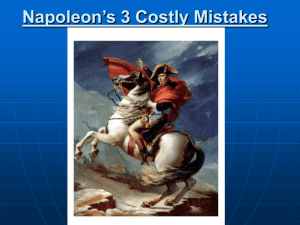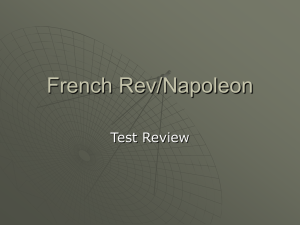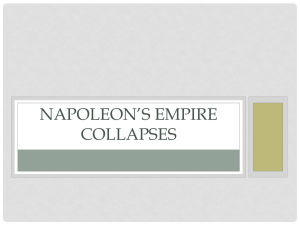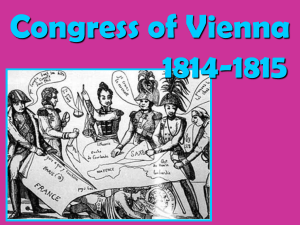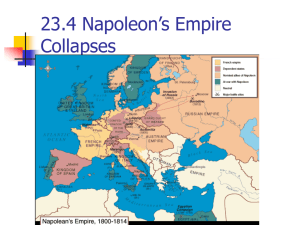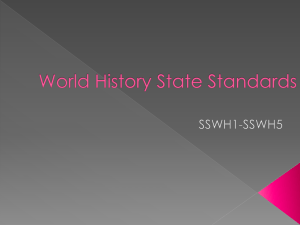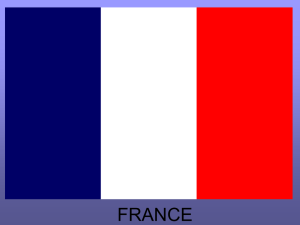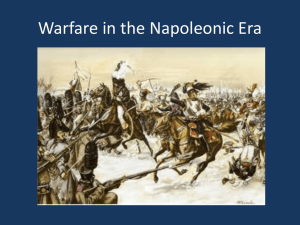Chapter 6 Section 4 The Age of Napoleon Begins
advertisement
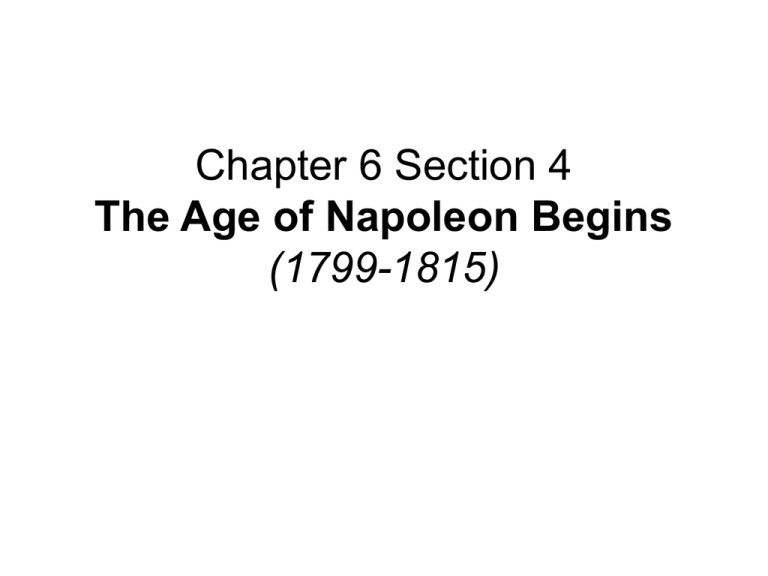
Chapter 6 Section 4 The Age of Napoleon Begins (1799-1815) Early Life • Born in Corsica, Mediterranean island, family not wealthy – Sent to France at 9 & trained for military – Ambitious, 20 a lieutenant at start of Revolution • Rose quickly in army – 1793 drove British out of Toulon – Victorious over Austrians but in 1798, led an expedition to Egypt which was disasters Rise to Power • 1799 became political leader – Overthrew Directory – Set up consulate – Took title of First Counsul – 1804 assumed title of Emperor of the French – Each step Napoleon held plebiscite (allowing voters to ballot) Napoleon Reforms • • • • • Restore economic prosperity Controlled prices Encouraged new industry Built roads & canals Set up public schools to train officials & military officers More Reforms • Made peace with Catholic Church in Concordat of 1801 • Placed Church under State control • Support from all classes – Let nobles return if took loyalty oath – Let peasants have land they bought from Catholic Church Napoleonic Code – New Code of Law • Equality of citizens before law – (except for women, lost most of rights) • Religious toleration • Advancement based on merit Napoleon's Military Strategy • Napoleon built an Empire in Europe – Success on battlefield • Rapid troop movement for more effective use of large armies • New plan for each battle, kept enemies confused – Grand French Empire Napoleon's Conquests • Annexed (added new areas) to France – Netherlands – Belgium – Parts of Italy & Germany • Abolished Holy Roman Empire, created & controlled Confederation of the Rhine • Cut Prussian territory in half • Controlled Europe through forced diplomacy – put friends & relatives on thrones Thorn in Napoleon's Side • France could not control Britain • Britain used sea power (1805) Battle of Trafalgar where British admiral Horatio Nelson beat French fleet • Napoleon waged economic war through Continental System • Closed European ports to British goods • Britain blockaded (shut off ports to keep people & supplies from moving in or out) European ports • British navy kept trade routes open to America & India Challenges • Challenges that threatened Napoleon’s empire • Revolutionary ideas spread across Europe – Reforms – Napoleonic Code – Economic reforms Resent of Napoleon • European nations resented Napoleon’s power & started revolts against France – Napoleon set up his brother as King of Spain – Napoleon tried to undermine the Catholic Church – Spanish resisted; French army treated Spanish badly • Spanish patriots – Used guerilla warfare (hit & run raids) – Kept French army fighting in Spain; could have been used elsewhere – British sent Duke of Wellington to help Spain Russia • Czar Alexander I of Russia angry over French – Austrian “alliance” • Didn’t like Continental System & withdrew Russia • Concerned that French Empire now bordered Russia 1812 Invasion of Russia • 1812, 400,000 European soldiers invaded Russia, led by Napoleon – Russians retreated eastward burning crops & villages – “Scorched Earth Policy” left French troops cold & hungry – French had to retreat 1000 miles, lost 300,000 men – French LOST! Napoleon’s Downfall • Russia united with Britain, Austria & Prussia, defeated French at Battle of Nations at Leipzig • 1814, Napoleon abdicated (stepped down from power) – Exiled to Elba (Mediterranean Is.) – Louis XVIII became king of France – Economic depression brought Napoleon back to power for 100 days Waterloo • British forces under Duke of Wellington & Prussian forces under General Bucher defeated Napoleon at Waterloo • Napoleon abdicated again & exiled to St. Helena, island in South Atlantic Napoleon’s accomplishments • France- centralized state government with constitution & greater access to education • World- spread ideas of Revolution & nationalism – Did away with Holy Roman Empire, lead to formation of new Germany – Sold Louisiana Territory to America, doubling size of U.S. Congress of Vienna • Goals of Congress of Vienna • Met for 10 months in 1814 & 1815; host – Emperor Francis I of Austria but real work done by: – Prince Metternich – Austria – Czar Alexander I - Russia – Lord Castlereagh – Britain – Prince Talleyrand – France Goal of Congress of Vienna • Chief goal – create lasting peace with balance of power & protect monarchs, contain France from further expansion – Metternich wanted status quo (the way things were) in 1792 – Alexander I wanted holy alliance of Christian kings to stop revolution – Castlereagh wanted to keep French military down – Talleyrand played other leaders against each other Europe’s Map Redrawn • To create a balance of power encircle France with strong nations, Vienna Congress redrew Europe’s map – Created Kingdom of Netherlands – Belgium, Luxembourg, Holland – Gave Prussia lands along Rhine River. – Gave Austria control of northern Italy Legitimacy • Legitimacy - gave kings back power in Portugal, Spain & Italian states, that they had in 1792 & restored Louis XVIII to power in France – Quadruple Alliance – Austria, Prussia, Russia, & Great. Britain pledged to maintain balance of power & stop revolutions • RESULT - Failed to see future conflicts because of nationalism
